And if cosmonautics were not?
A year ago, on Cosmonautics Day, I tried to talk about how space and cosmonautics are good. But you can try to answer this question by approaching from the opposite side. How would we live if there was no astronautics?

Photo: Yevgeny Katyshev / Wikimedia Commons
Suppose that for some fantastic reason cosmonautics did not appear in the 20th century. We are not interested in a specific reason, so we will not try to invent something plausible, it is much more interesting to imagine what will happen to humanity.
The biggest problems start with communication. Several factors begin to play against us. The earth is round, and radio waves propagate through it in different ways.
')
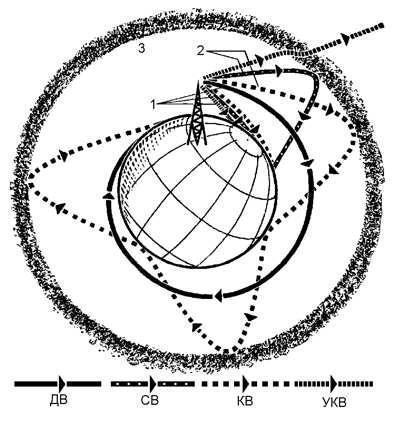
Long waves (DV) propagate over the surface and are able to go around the globe.
Medium waves (SV) are capable of bending around the Earth and reflecting off the ionosphere.
Short waves (CV) are reflected from the ionosphere with small losses and do this many times, allowing communication over long distances.
And finally, ultrashort waves (VHF) propagate in a straight line, do not go around the Earth and are not reflected from the ionosphere.
And if you thought that mankind without astronautics will easily switch to longer waves, then I have a few unpleasant surprises for you.
First, the size of the antenna depends on its operating range. And the classic quarter-wave antenna for operation at a wavelength of 1 km (DV range) is obtained with a length of 250 m. Oops.
In Ufa, there was a radio station PB-1 named after the Comintern, which broadcast on long and medium waves and used antennas on four two-hundred-meter masts.
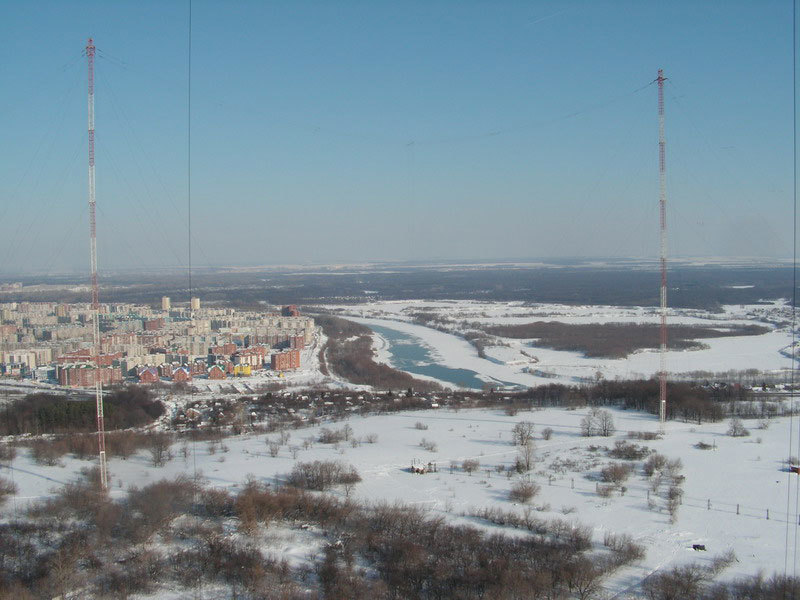
Two of four antennas, photo radiomap.eu
In our reality, these masts were demolished as unnecessary to zero, and in an alternate reality without astronautics, every self-respecting country would have similar facilities. And on KDPV above, probably, the most monstrous similar construction in the world is shown - the communication complex with the submarines “Goliath” near Nizhny Novgorod. It is used now. In our reality, many radio stations operating on long and medium waves have closed. And in an alternate reality, the wavelength range would be a strategic resource that would be distributed at the level of international organizations, because it is simply not enough for all interested countries.
Secondly, the data transfer rate depends on the channel width and transmitter power. And with increasing wavelength, the allowable channel width decreases. Voice communication would still fit, but you can forget about the Internet in this range. In order to transfer data at high speed, it is necessary to reduce the wavelength. And VHF is distributed only in the area of direct radio visibility. So, in the 20th century, it would have been necessary to build repeater masts en masse.
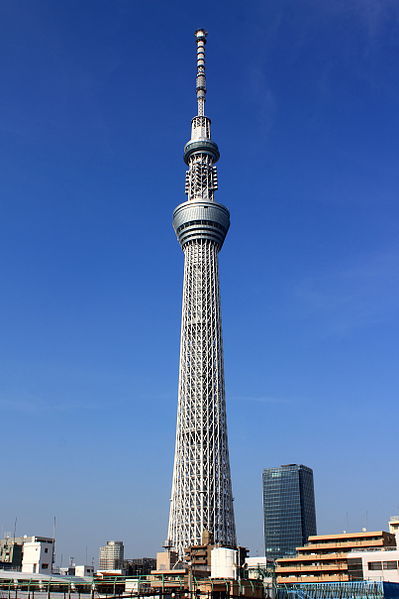
Photo: Kakidai / Wikimedia Commons
Meet this Tokyo Sky Tree TV Tower, 634 meters high, the tallest TV tower in the world. Using a simple formula, one can calculate that two such towers can communicate with each other at a distance of up to 179 km. If we increase the height of the towers to a thousand meters, the communication range will grow to only 225 km, fantastically high towers of two thousand meters will be enough only for 319 km. At some point, the cost of increasing the height will exceed the benefit of increasing the distance of communication, so that ultra-high towers in the alternate world will not appear without astronautics, but there will simply be a lot of high ones. By the beginning of the 21st century, like us, fiber-optic cables will spread, but, like repeaters, they will only be in relatively large cities, and it will be difficult to reach the periphery. In our world, satellite equipment can be installed even in a very remote village.
Conclusion : Cosmonautics greatly facilitates communication between people and reduces digital inequality.
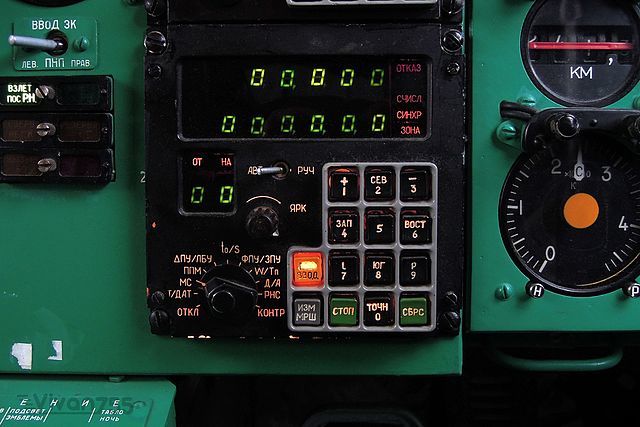
Panel RSDN on the Tu-154, photo Vivan755 / Wikimedia Commons
The lack of GPS / GLONASS will not be a disaster, but rather a serious nuisance. Some modern geographic information services will be able to work approximately as now and without cosmonautics. Our smartphones are based on base stations and can determine their position by triangulation on them. Accuracy, of course, will be lower, and there will be no navigation outside the stations, but if there is a network, it will be possible, as in our world, to use maps and even catch Pokémon. Another thing in a situation where the base stations will not. Airplanes and ships will have to use radio beacons, for example, in Russia, in parallel with GLONASS, radio systems of near and far navigation of RSBN and RSDN operate. The RSDN has an accuracy of 2.5-7 km and a range of up to ten thousand kilometers, which allows you to fly quite confidently. Similar systems exist in the USA. But there will be no bombs and missiles very accurately guided by GLONASS / GPS; instead, they will have to use inertial systems, in which their accuracy decreases with the operating time (and the range they have time to fly). And tourists will have hard times - navigation complexes on radio beacons are large and heavy, you will not drag around with you.
Conclusion : Astronautics helps a lot when navigating away from populated areas.
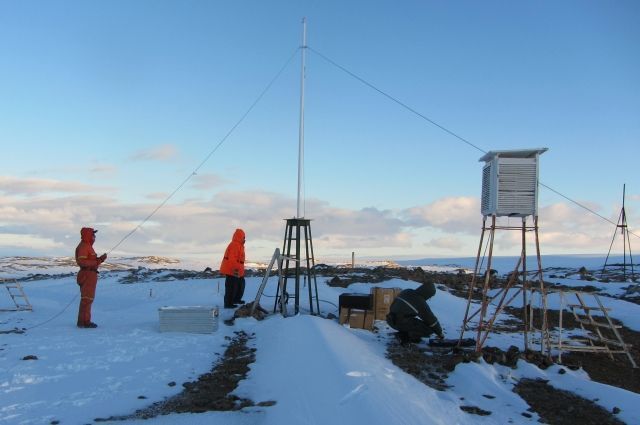
Polar meteorologist, AARI photo
Do you know who the radio operator Krenkel is? Ernst Theodorovich in the thirties was a famous radio operator in the Arctic and provided communication with the first drifting station, the North Pole. Due to the problems that we have already considered, in the alternative world, the profession of a signalman will be more respected and heroic than ours. But this is not all the reasons. Humanity needs an accurate weather forecast. We are good - from above satellites can give a picture in different ranges and close to a low orbit, and from a distance, from a geosynchronous one. But without cosmonautics, the only way to get a more or less working weather forecast would be to create a network of meteorological stations in the maximum possible territory. Such stations will have to be put completely off the beaten path, and they will work for weather-beaten meteorologists and severe signalmen. There will be a lot of romance in such work, but alas, there is little comfort. And, all the same, the accuracy will be lower than ours. In the vast expanses of the ocean, where you will not install a grid of weather stations, deadly hurricanes will arise, like in our country, but in an alternative world they will hit coastal cities without warning.
Conclusion : Astronautics saves money and saves lives by helping to form accurate weather forecasts.
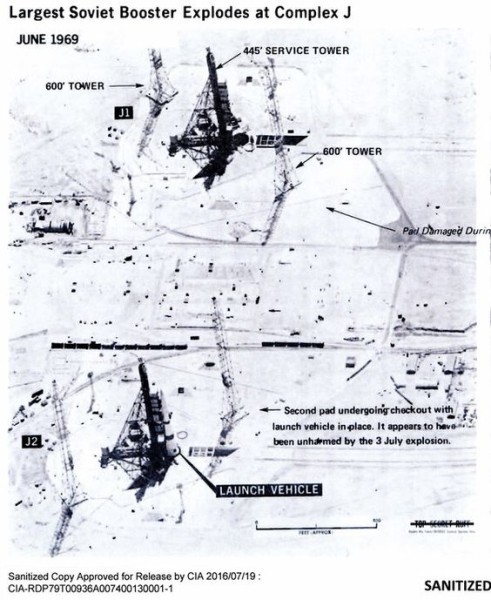
Top secret Soviet H-1 missiles, photo from a US intelligence satellite
Along with the space will disappear military photo reconnaissance. To make an up-to-date map based on photographs of the territory will be possible only by aerial photography. But, if the satellites can fly over any point, the aircraft will need the permission of the country over which they will fly. And countries will be able to effectively hide not only their military facilities, but also places of something unpleasant, such as man-made disasters or concentration camps.
Conclusion : Astronautics makes the world more open.
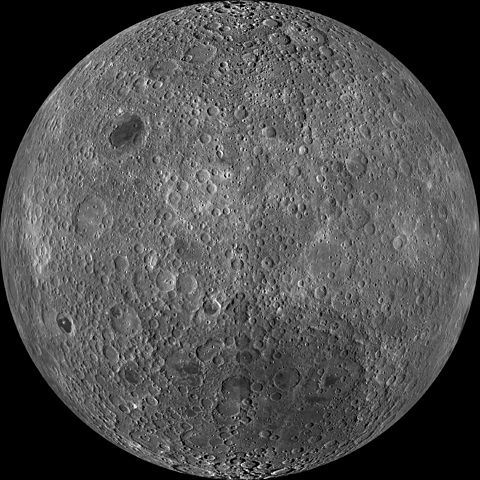
The other side of the moon, photo by NASA
Modern ground-based telescopes in their characteristics almost equal to the Hubble Space Telescope. Adaptive optics allows you to almost completely remove the vibrations of the atmosphere, which distort the picture for the ground observer. But from the Earth, not everything can be seen and recognized. Without cosmonautics, we still would not know anything about what the reverse side of the moon looks like. And at the beginning of the 21st century there would be disputes about the presence of plants and animals on Mars and Venus - yes, a lot of data can be obtained from a distance, but only direct observation from a nearby interplanetary station or even landing on the surface of a robot can finally stop disputes of conflicting scientific models. For Venus, one could only get a low-resolution map from radar observations. And no one would know what is happening under the opaque atmosphere of Titan. If you wish, you could even believe that there is a second Earth on the opposite side of the Sun - there is the Lagrange point L 3 there , and the idea that there could be something there was once quite popular.
Conclusion : Cosmonautics gives us unique knowledge.
Happy Cosmonautics Day!

Photo: Yevgeny Katyshev / Wikimedia Commons
Formulation of the problem
Suppose that for some fantastic reason cosmonautics did not appear in the 20th century. We are not interested in a specific reason, so we will not try to invent something plausible, it is much more interesting to imagine what will happen to humanity.
The most resonant of the frequencies
The biggest problems start with communication. Several factors begin to play against us. The earth is round, and radio waves propagate through it in different ways.
')

Long waves (DV) propagate over the surface and are able to go around the globe.
Medium waves (SV) are capable of bending around the Earth and reflecting off the ionosphere.
Short waves (CV) are reflected from the ionosphere with small losses and do this many times, allowing communication over long distances.
And finally, ultrashort waves (VHF) propagate in a straight line, do not go around the Earth and are not reflected from the ionosphere.
And if you thought that mankind without astronautics will easily switch to longer waves, then I have a few unpleasant surprises for you.
First, the size of the antenna depends on its operating range. And the classic quarter-wave antenna for operation at a wavelength of 1 km (DV range) is obtained with a length of 250 m. Oops.
In Ufa, there was a radio station PB-1 named after the Comintern, which broadcast on long and medium waves and used antennas on four two-hundred-meter masts.

Two of four antennas, photo radiomap.eu
In our reality, these masts were demolished as unnecessary to zero, and in an alternate reality without astronautics, every self-respecting country would have similar facilities. And on KDPV above, probably, the most monstrous similar construction in the world is shown - the communication complex with the submarines “Goliath” near Nizhny Novgorod. It is used now. In our reality, many radio stations operating on long and medium waves have closed. And in an alternate reality, the wavelength range would be a strategic resource that would be distributed at the level of international organizations, because it is simply not enough for all interested countries.
Secondly, the data transfer rate depends on the channel width and transmitter power. And with increasing wavelength, the allowable channel width decreases. Voice communication would still fit, but you can forget about the Internet in this range. In order to transfer data at high speed, it is necessary to reduce the wavelength. And VHF is distributed only in the area of direct radio visibility. So, in the 20th century, it would have been necessary to build repeater masts en masse.
Photo: Kakidai / Wikimedia Commons
Meet this Tokyo Sky Tree TV Tower, 634 meters high, the tallest TV tower in the world. Using a simple formula, one can calculate that two such towers can communicate with each other at a distance of up to 179 km. If we increase the height of the towers to a thousand meters, the communication range will grow to only 225 km, fantastically high towers of two thousand meters will be enough only for 319 km. At some point, the cost of increasing the height will exceed the benefit of increasing the distance of communication, so that ultra-high towers in the alternate world will not appear without astronautics, but there will simply be a lot of high ones. By the beginning of the 21st century, like us, fiber-optic cables will spread, but, like repeaters, they will only be in relatively large cities, and it will be difficult to reach the periphery. In our world, satellite equipment can be installed even in a very remote village.
Conclusion : Cosmonautics greatly facilitates communication between people and reduces digital inequality.
Not Found, Not Found

Panel RSDN on the Tu-154, photo Vivan755 / Wikimedia Commons
The lack of GPS / GLONASS will not be a disaster, but rather a serious nuisance. Some modern geographic information services will be able to work approximately as now and without cosmonautics. Our smartphones are based on base stations and can determine their position by triangulation on them. Accuracy, of course, will be lower, and there will be no navigation outside the stations, but if there is a network, it will be possible, as in our world, to use maps and even catch Pokémon. Another thing in a situation where the base stations will not. Airplanes and ships will have to use radio beacons, for example, in Russia, in parallel with GLONASS, radio systems of near and far navigation of RSBN and RSDN operate. The RSDN has an accuracy of 2.5-7 km and a range of up to ten thousand kilometers, which allows you to fly quite confidently. Similar systems exist in the USA. But there will be no bombs and missiles very accurately guided by GLONASS / GPS; instead, they will have to use inertial systems, in which their accuracy decreases with the operating time (and the range they have time to fly). And tourists will have hard times - navigation complexes on radio beacons are large and heavy, you will not drag around with you.
Conclusion : Astronautics helps a lot when navigating away from populated areas.
The guy fell three thousand miles of taiga
Polar meteorologist, AARI photo
Do you know who the radio operator Krenkel is? Ernst Theodorovich in the thirties was a famous radio operator in the Arctic and provided communication with the first drifting station, the North Pole. Due to the problems that we have already considered, in the alternative world, the profession of a signalman will be more respected and heroic than ours. But this is not all the reasons. Humanity needs an accurate weather forecast. We are good - from above satellites can give a picture in different ranges and close to a low orbit, and from a distance, from a geosynchronous one. But without cosmonautics, the only way to get a more or less working weather forecast would be to create a network of meteorological stations in the maximum possible territory. Such stations will have to be put completely off the beaten path, and they will work for weather-beaten meteorologists and severe signalmen. There will be a lot of romance in such work, but alas, there is little comfort. And, all the same, the accuracy will be lower than ours. In the vast expanses of the ocean, where you will not install a grid of weather stations, deadly hurricanes will arise, like in our country, but in an alternative world they will hit coastal cities without warning.
Conclusion : Astronautics saves money and saves lives by helping to form accurate weather forecasts.
Above us does not let life, and below we do not know how

Top secret Soviet H-1 missiles, photo from a US intelligence satellite
Along with the space will disappear military photo reconnaissance. To make an up-to-date map based on photographs of the territory will be possible only by aerial photography. But, if the satellites can fly over any point, the aircraft will need the permission of the country over which they will fly. And countries will be able to effectively hide not only their military facilities, but also places of something unpleasant, such as man-made disasters or concentration camps.
Conclusion : Astronautics makes the world more open.
This round moon doesn't care

The other side of the moon, photo by NASA
Modern ground-based telescopes in their characteristics almost equal to the Hubble Space Telescope. Adaptive optics allows you to almost completely remove the vibrations of the atmosphere, which distort the picture for the ground observer. But from the Earth, not everything can be seen and recognized. Without cosmonautics, we still would not know anything about what the reverse side of the moon looks like. And at the beginning of the 21st century there would be disputes about the presence of plants and animals on Mars and Venus - yes, a lot of data can be obtained from a distance, but only direct observation from a nearby interplanetary station or even landing on the surface of a robot can finally stop disputes of conflicting scientific models. For Venus, one could only get a low-resolution map from radar observations. And no one would know what is happening under the opaque atmosphere of Titan. If you wish, you could even believe that there is a second Earth on the opposite side of the Sun - there is the Lagrange point L 3 there , and the idea that there could be something there was once quite popular.
Conclusion : Cosmonautics gives us unique knowledge.
Happy Cosmonautics Day!
Source: https://habr.com/ru/post/403047/
All Articles